Sports Therapy and Rehabilitation
Discover the world of sports therapy and learn to diagnose, treat and prevent sporting injuries.
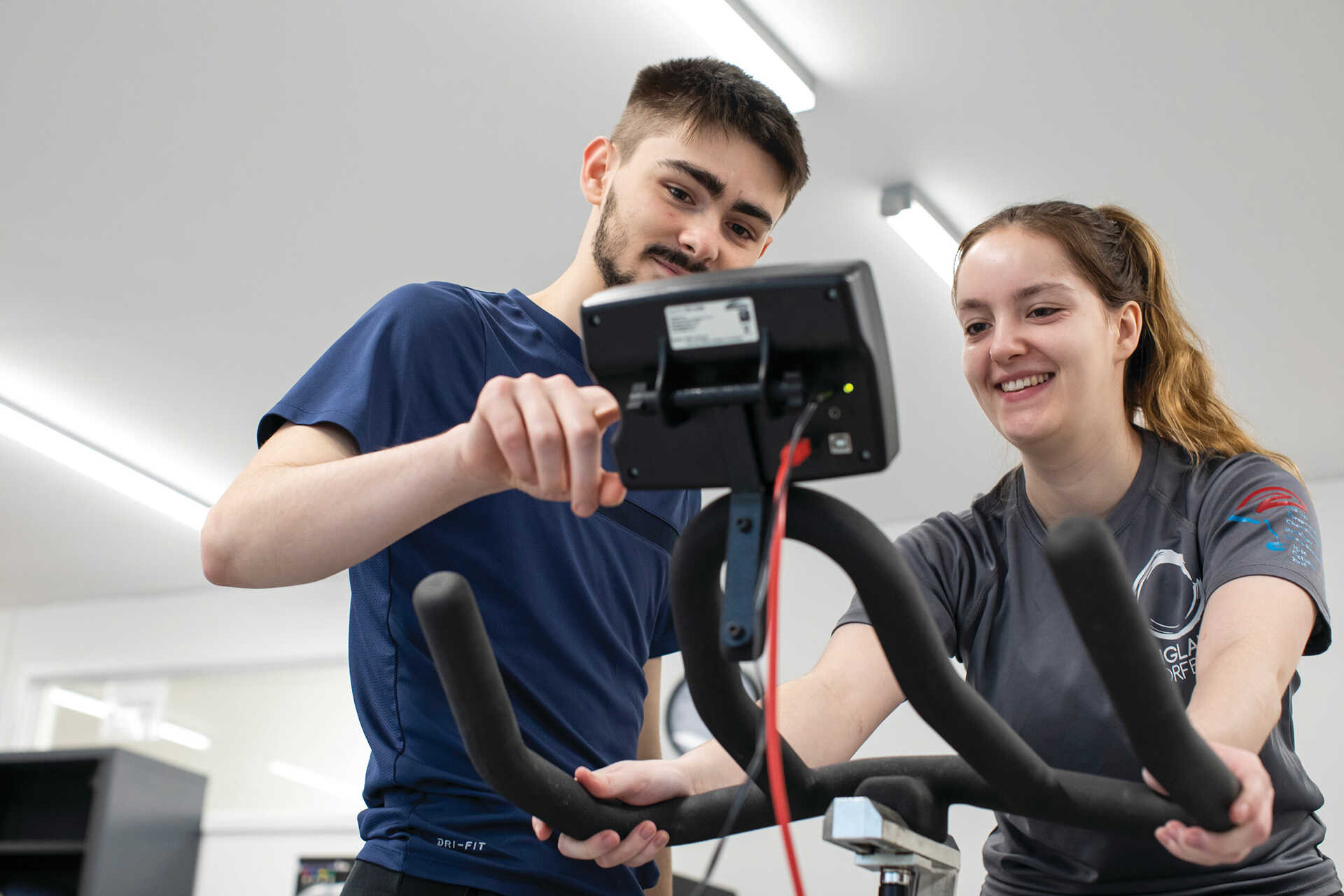
Discover the world of sports therapy and learn to diagnose, treat and prevent sporting injuries.
Make a difference by studying a degree in Sports Therapy and Rehabilitation.
Sports therapy and rehabilitation is one of the fastest-growing areas in the sports and healthcare sector and at Kent we are dedicated to giving you the best start to a career in this exciting field. From diagnosis and treatment to the prevention of injuries, studying Sports Therapy and Rehabilitation at Kent equips you with the extensive knowledge and skills needed to work in a range of environments.
You'll gain a good mix of theoretical knowledge, and valuable laboratory and clinical skills. Get hands-on experience in our excellent facilities including laboratories and custom-built teaching spaces, and complete a placement to put your learning into practice. You'll develop the expertise to treat elite athletes, teach specialist exercise groups or set up your own business as an independent Sports Therapist and Rehabilitator.
Together with our dedicated careers and employability support, studying at Kent gives you the edge in pursuing a career in a range of areas including research and development, within a sports club and sports rehabilitation.
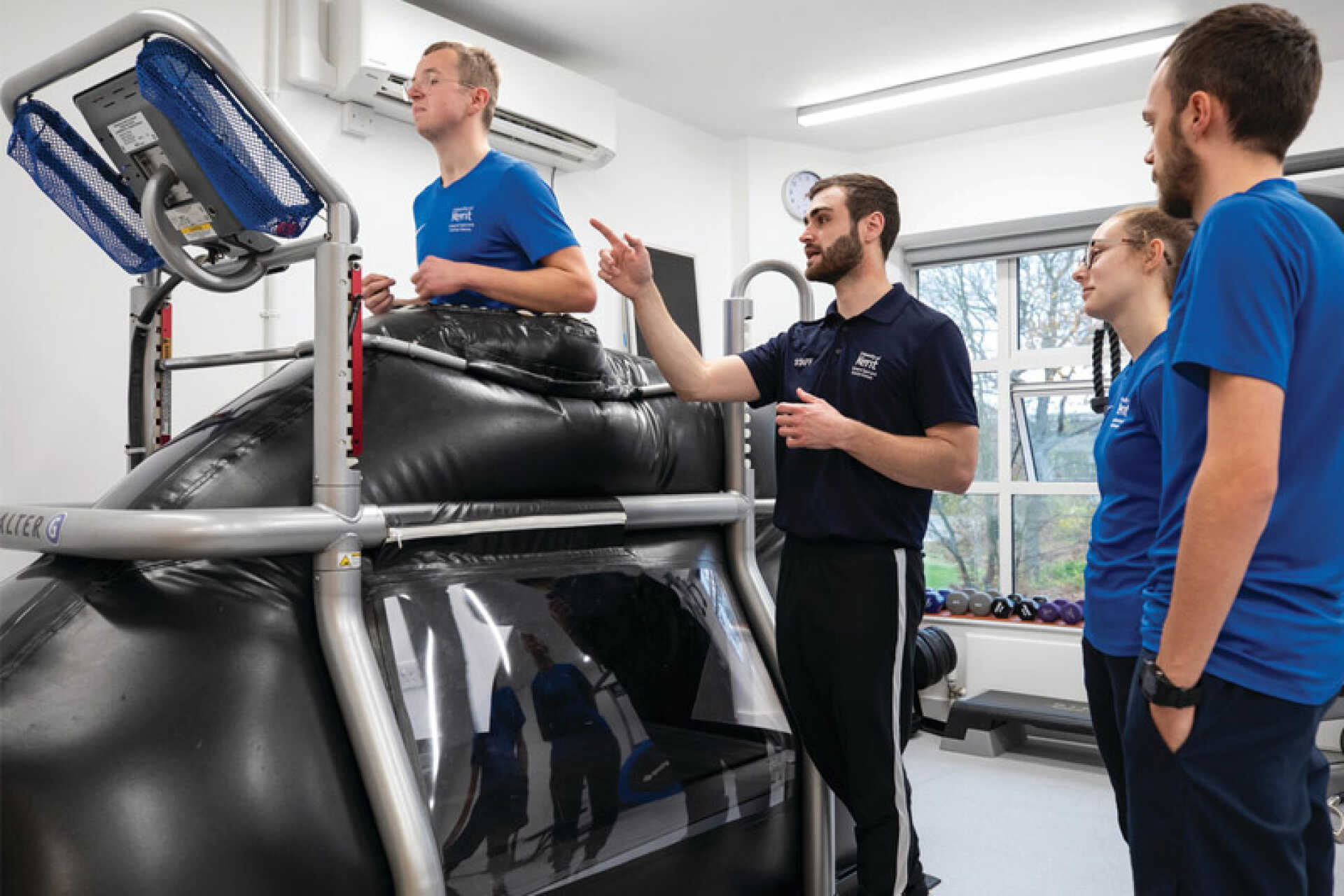
Dr Kyra De Coninck explains the skills you'll gain from the Sports Therapy and Rehabilitation degree at Kent.
Sports Science at Kent scored 88% overall in The Complete University Guide 2023.
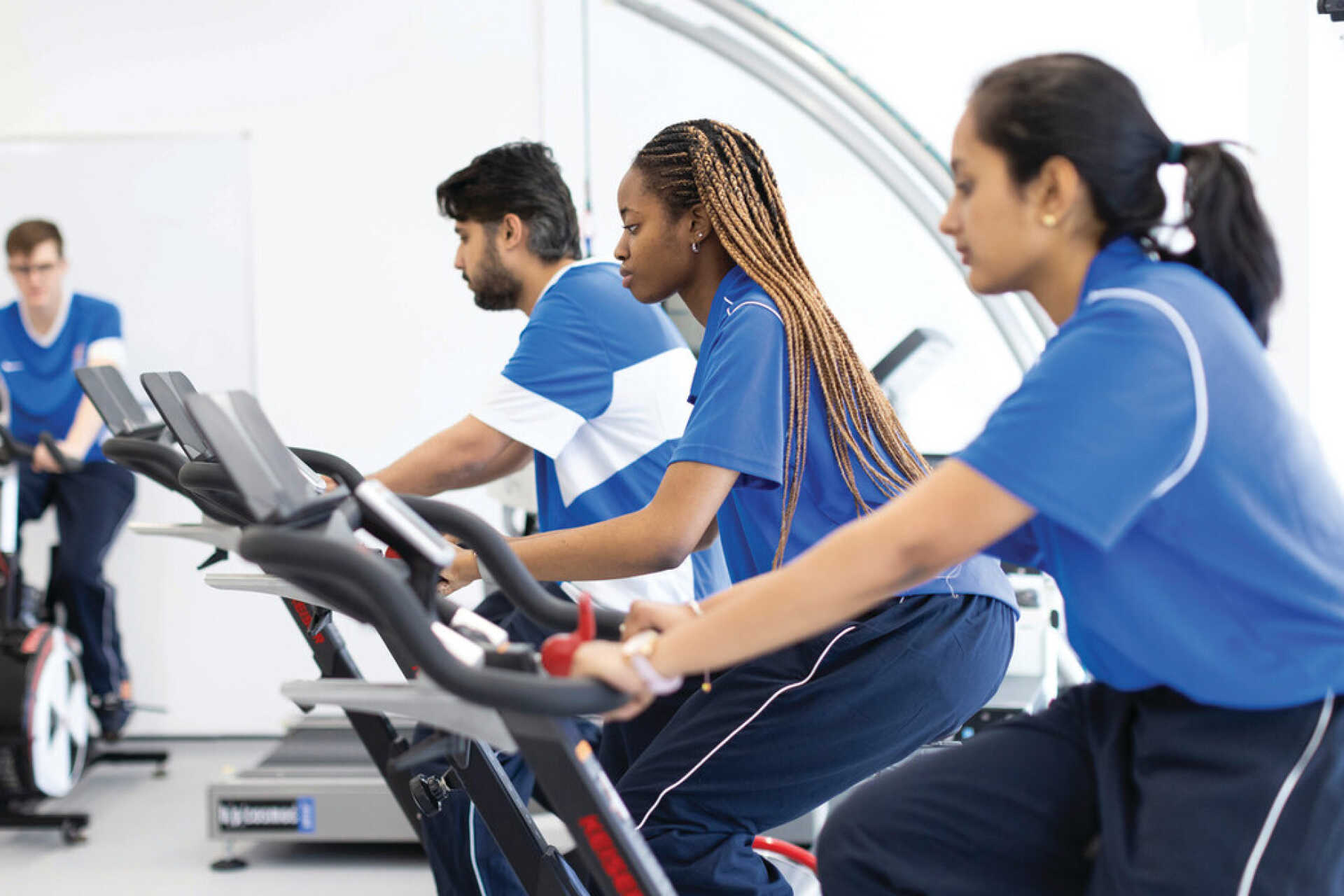
You'll gain invaluable real-world experience in our laboratories and clinics.
The course is accredited by the British Association of Sport Rehabilitators and Trainers (BASRaT).
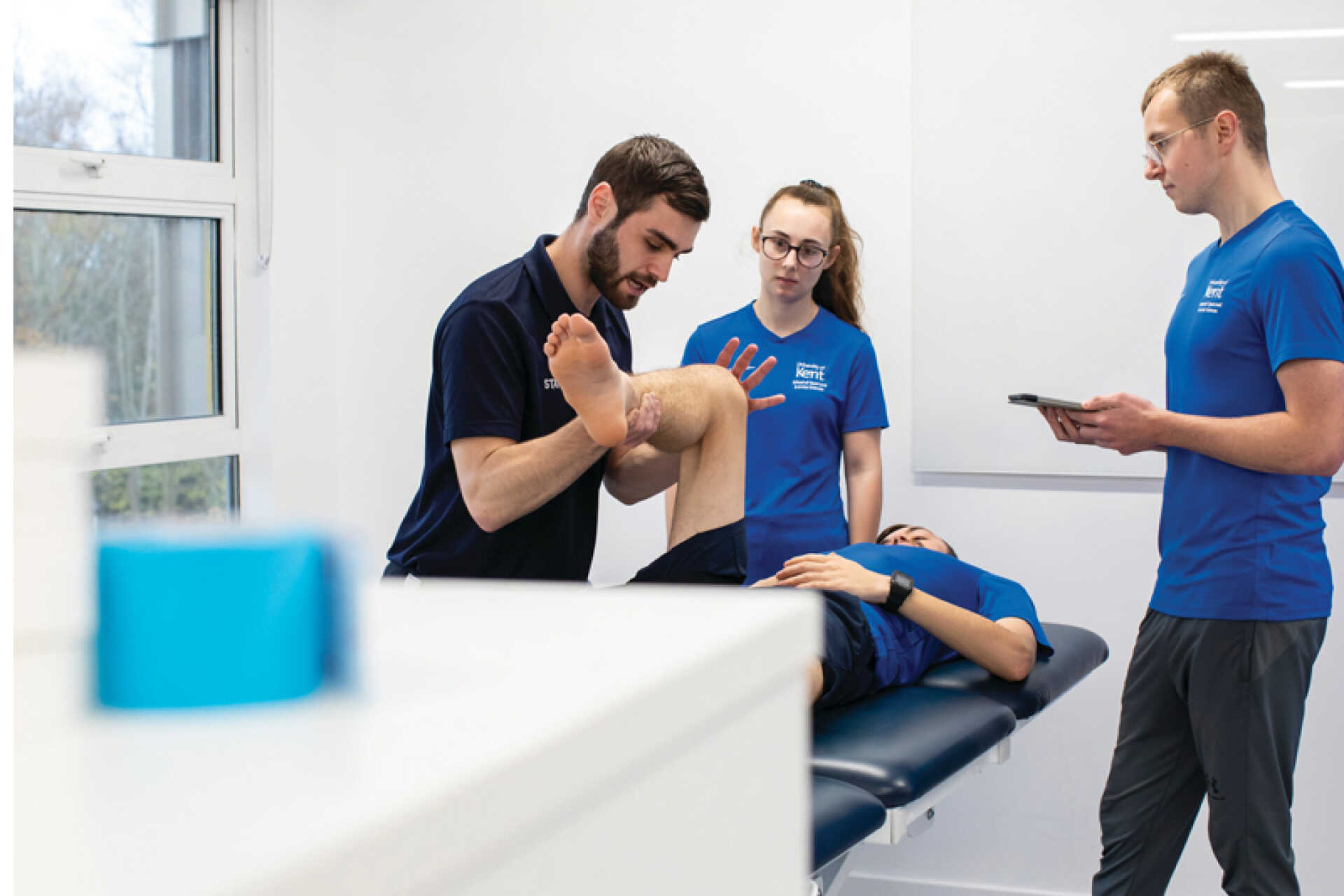
You'll gain invaluable practical experience and confidence in your ability to work with clients at all levels of fitness.
Our typical offer levels are listed below and include indicative contextual offers. If you hold alternative qualifications just get in touch and we'll be glad to discuss these with you.
BBC including B in an appropriate subject (eg Biology, Chemistry, Sport, Physical Education, Physics, Psychology, Statistics, Mathematics, Applied Science, Human Biology)
Distinction, Merit, Merit in a Sports, Sports Coaching or Science related subject.
112 tariff points - typically H5, H5, H6 at HL including Biology/Chemistry/Physics/Mathematics, Sports, Exercise and Health Science 5 at HL or 6 at SL and Mathematics 4 at HL or SL.
Mathematics grade C / 4
N/A
Merit overall in Science with a minimum of grade B for the core components (including grade B in the core B examination) and merit overall in the occupational specialism component.
The University welcomes applications from Access to Higher Education Diploma candidates for consideration. A typical offer would be to achieve 45 Credits at Level 3 with 18 credits at Distinction and 24 credits at Merit in Sports Science or Health and Applied Science. Other courses can be considered by the Admissions Officer to ensure they hold the required Level 3 science credits.
We consider all applications on an individual basis during Clearing and you're encouraged to get in touch to discuss your grades. You're most likely to be offered a place in Clearing for this course if you hold the following subjects:
GCSE / IB - Mathematics
A Level - Physical Education, Biology, Human Biology, Chemistry, Physics, Maths, Applied Science, Statistics or Psychology
BTEC - Sport, Fitness & Personal Training, Sports Coaching & Development, Sporting Excellence & Performance, Sport or Science discipline
IB - Biology, Chemistry, Physics, Maths or Sport, Exercise & Health Science
The following modules are offered to our current students. This listing is based on the current curriculum and may change year to year in response to new curriculum developments and innovation:
Students will cover the biomechanics of movement, movement patterns of the lower limb, upper limb and trunk; bones and surface markings of the lower limb, upper limb and spine; joints of the lower limb, upper limb and spine; muscles (origin, insertion and actions) of the lower limb, upper limb and trunk; soft tissue structures of the lower limb, upper limb and trunk; and nerves of the lower limb, upper limb and trunk.
The main aims of this module are to explore and gain knowledge of human physiology. Students will study the major systems of the human body including the musculoskeletal system, the cardiovascular system and the nervous system. Students will gain an understanding of their structure and function.
This module will enable students to interpret the pathophysiology of a range of sports injuries by mechanism of injury, anatomical region and tissue type. The module develops the students' ability to relate the mechanism of injury to the pathology of sports injuries. Students will also be required to understand the risk factors associated with sports injuries.
This module will introduce skills in problem solving and clinical reasoning including subjective and objective assessment and the relation to presenting signs and symptoms. The module develops your ability to examine and clinically assess your client, focusing on the upper and lower limbs. You will learn how to assess range of movement, muscle length and strength, ligamentous stability as well as how and when to apply a number of special tests.
This module will enable students to acquire an understanding of sports massage, in order to practically demonstrate a range of sports massage skills effectively and safely. The module also develops the students' ability to record and review their own sports massage sessions with clients. Content will include all skills required in order to carry out a full body sports massage. Basic sports massage strokes such as effleurage, petrissage, tapotement and frictions will be included. These strokes will be applied on the back, shoulders, gluteals, legs, feet, arms, hands, chest, neck and abdomen. Underpinning knowledge will include record keeping, professional ethics and code of practice, as well as health and safety regulations.
The course takes the form of an individual research study. There are 4 taught lectures covering the management of a research project. The research projects are then conducted with the supervision of a department tutor who will advise the student on issues such as methodology, analysis and presentation. It is the student’s responsibility to organise, conduct, analyse and present the research as required.
Module information to be confirmed.
What does it take to be a well-rounded scientist in the fields of sport and exercise performance, therapy and rehabilitation, and health? How would you go about designing a study, collecting the data, and analysing the results? How will the knowledge you develop improve our understanding?
In this module, you’ll gain an understanding of research methods typically used in a sport and exercise and/or a therapy and rehabilitation setting. You’ll develop the ability to select, employ and interpret statistics in your research. This knowledge is central to being an effective sports scientist, sports therapist or rehabilitator.
By the end of this module, you’ll understand the fundamentals of forming a feasible and appropriate study. You’ll also have the tools and techniques you’ll need to conduct independent research in the final year of your degree.
Once you have identified an injury and the bodily structure(s) involved, a sports therapy and rehabilitation practitioner needs to deliver appropriate treatment to restore normal movement and function. Manual therapy is the art and science of skilled hand movements and mobilisations for therapeutic effect.
You’ll learn the key concepts and theories that underpin manual therapy techniques and put them into practice alongside other complementary therapeutic modalities such as taping. One of the most common presentations that you are likely to see as a qualified practitioner is injury to the spine. You’ll therefore focus on the spine and associated spinal pathology so that you are confident in managing common spiral injuries. You’ll also acquire essential skills in relevant manual therapy interventions. These skills are essential to you in starting a career in sports therapy.
Global healthcare systems are increasingly challenged by populations living longer, and living in poor health. What if some health conditions could be easily prevented before they were diagnosed? This module will help you deepen your understanding of the role physical activity and other lifestyle factors play in preventing a range of chronic cardiovascular, respiratory, metabolic and mental health conditions.
You’ll learn to identify key risk factors, understand the physiological basis for how conditions develop, and explore how physical activity can be used in the prevention and pre-clinical management of these conditions. Using evidence-based practice, you’ll tailor physical activities for the benefit of different conditions and consider some of the key contraindications and concurrent health challenges that pre-clinical populations may face.
Finally, you’ll evaluate current public health messaging and guidance for target audiences, and apply your knowledge and the latest research to develop guidance and resources of your own.
Rehabilitation is an essential and highly effective skill for any sports therapy practitioner. You will learn the core principles of rehabilitation such as how to improve strength, range of motion, flexibility, power, speed and agility. These are all principles that are applied when evaluating every athlete and individual you work with, whether the aim is reducing pain or return to sport after injury.
You’ll implement the principles of rehabilitation in each stage of injury and discover how you can adapt exercises according to the specific injury, its stage in the healing process, and the nature of the sport involved. After finishing the module, you’ll have the fundamental tools to make appropriate and evidence-based judgements to support injury recovery. You’ll be able to use these in future modules, within practical and work placement opportunities and your future career.
What are the steps needed to take an athlete from the moment of injury to a return to their sport? This module will show you how to apply your knowledge of anatomy, physiology, clinical evaluation and rehabilitation to specific injuries.
You’ll consider the structures of injuries you’re likely to frequently encounter, assess and manage in rehabilitation when working with injured individuals. You’ll formulate sport-specific rehabilitation programmes for athletes and individuals for the duration of their injury journey, from the first day of initial injury and acute management through to key rehabilitation stages.
By the time you finish this module, you’ll be able to develop evidence-based and end-to-end rehabilitation plans for an athlete, supporting their ongoing care and minimising re-injury by assessing when they are physically and mentally ready to return to sport.
Sport and physical activity is for everyone, and the way we choose to participate and perform changes through our life course.
When it comes to physical activity and sport, there is no ‘one size fits all’, and diverse guidelines exist to meet the specific needs of children, youth, females, pregnancy, disability, adults and older adults.
Each week you will examine a different life course stage, and you will consider specific physical activity and training modifications that can be applied to maximise health, fitness and performance potential according to individual goals and needs. You’ll explore the physiological, biological and psychosocial changes we all experience throughout our lives and learn how to consider these when we are working with people from all stages of their own lives.
Upon completion, you'll be equipped to provide relevant and tailored recommendations to individuals to support health improvement, training for performance, and lifelong participation. Improving your ability as a practitioner and supporting more people getting involved in sport for health.
Clinical practice is key to becoming a confident and competent sports therapy and rehabilitation practitioner. This module will integrate your academic knowledge and skills into professional patient-facing experience.
Under supervision from staff, you’ll encounter real-life patients in our in-house student-led injury clinic, where you can put your clinical and rehabilitation skills into authentic practice, helping clients recover from injury and preventing future injuries.
You’ll have the opportunity to develop both professionally and personally as you build your skills. Accompanying lectures will focus on personal reflection and development, building your profile so that you have all the necessary professional tools to succeed in the industry after you graduate.
Research into sports therapy and rehabilitation shapes current and future practice, and this module allows you to conduct research of your own by designing, conducting and completing an extended project on a specialist topic of sports therapy and rehabilitation. You’ll put the skills you’ve developed during your studies into practice, and comprehensively engage in a topic that you’re interested in and passionate about.
After identifying an appropriate research question, you’ll expand your knowledge by forming a search strategy, reviewing the literature and critically evaluating the current body of research. You’ll apply your understanding of research methods to designing an experimental approach and collecting data which you can analyse, present and report in scientific communications. You’ll be supported by lectures that cover the planning, management and dissemination of the project. However, a majority of the learning experience will be led by you, with support from a project supervisor.
Your supervisor will advise you on methodology, analysis and presentation, and will create an environment which will cultivate independent work and thinking. The qualities and skills that you develop during your dissertation will set you up for postgraduate study or a career as an evidence-based sports rehabilitation practitioner.
A critical role for sports therapy and rehabilitation professionals is reducing the likelihood of injury for the athletes they support. In this module, you’ll cover risk factors for specific injuries and learn how to apply this knowledge to help reduce the risk of injury in different sports. As well as learning to analyse injury incidence data across different sports and injury types.
You’ll evaluate injury prevention models and injury prevention programmes using best practice and emerging research, including strategies for athletes to recover from training, matches and competitions. This will help you minimise injury risk for your clients and enhance their recovery so that they can perform at their best for longer.
Building on what you learnt during the Clinical Practice and Professional Development module, you’ll integrate clinical reasoning and critical analysis skills to address more complex spinal and peripheral joint injuries within our in-house student-led injury clinic.
You’ll begin to master clinical assessment and patient handling skills while using more specialised and advanced rehabilitation equipment and techniques, based on the latest evidence-based research. Throughout the module, you’ll critically evaluate and reflect on your skills and your patient's rehabilitation journey, which will transform you into a confident and competent autonomous practitioner ready to succeed in the industry once you graduate.
Building on what you learnt during the Clinical Practice and Professional Development module, you’ll integrate clinical reasoning and critical analysis skills to address more complex spinal and peripheral joint injuries within our in-house student-led injury clinic.
You’ll begin to master clinical assessment and patient handling skills while using more specialised and advanced rehabilitation equipment and techniques, based on the latest evidence-based research. Throughout the module, you’ll critically evaluate and reflect on your skills and your patient's rehabilitation journey, which will transform you into a confident and competent autonomous practitioner ready to succeed in the industry once you graduate.
How do new scientific breakthroughs become embedded positively within society? How do we build trust and confidence in science and technology, so that the public are empowered to make the best decisions for themselves and those around them? How do we sustain a strong future for science by inspiring the next generation? Consider key principles in science communication, reflect on specific historic and contemporary case studies, and develop a personal and professional understanding of your social roles and responsibilities as a scientist.
You will explore ways in which scientist construct key messages in the context of professional disciplines such as media, policy makers, private sector and charitable organisations, and understand the role that scientists play outside of the immediate scientific environment. Finally, you will apply best practice in science communication and public engagement to global challenges for which science and technology provides potential solutions.
Physical activity has an important function in the management of many clinical conditions. You’ll learn how the health, wellbeing and quality of life benefits of being active can help to manage, treat and even reverse some chronic conditions.
What kind of activities can clinical populations take part in? How can activities be adapted to make them safe and manageable? You’ll discover how to safely perform appropriate exercise tests, how to interpret test results and use them to develop suitable physical activity prescription based on disease specific guidelines and research evidence. You will explore innovative approaches to therapeutic exercise training for cardiovascular diseases, type-2 diabetes, cancer, and neurological disorders. Building on your prior knowledge, you’ll develop tailored exercise prescription which utilises principles of training, accommodates disease limitations and medications, and expand your thinking to address the bio-psychosocial and adherence challenges in clinical groups.
An industry placement is the perfect opportunity for you to explore a future career pathway in an applied field. Utilising the theoretical knowledge gained from your studies to real-world scenarios, you will gain professional experience which will enhance your employability skills as well as deepen your understanding and application of theoretical concepts in the workplace.
You will become integrated into the work environment, shadowing and interacting with professionals in their field, and taking on core responsibilities with the support of an experienced supervisor who will provide continued mentorship and support. In this work environment, you will utilise concepts and competencies gained during your degree to address regular organisational challenges and solve problems and reflect on your personal and professional strengths and areas for development.
After your placement, you will have boosted your employability through developing important transferable skills such as communication, teamwork, time management, and problem-solving. The experience and network gained from this opportunity will make you stand out to employers and kick-start your career.
Why is strength and conditioning of key importance for athletic development and in maximising physical performance? Drawing on contemporary and traditional research, you will critically analyse the scientific principles of strength and conditioning, then apply those principles into practical coaching delivery.
You will consider and evaluate a range of contemporary and traditional training approaches, to determine best practice for a range of athletes across different sports. Finally, you will consider how coaching skills and delivery styles could impact athlete development and reflect on your coaching delivery to optimise effectiveness and develop sector-wide professional skills.
How do we prepare athletes to succeed at the very top level of sport? You will evaluate and integrate various testing and monitoring approaches with different populations and interpret that data to determine an optimal programming approach.
You will consider the technical models for compound and Olympic lifting modalities, and critically analyse the effects of biomechanical deviations on performance. Programming and coaching adjustments for a range of different populations will be considered. Finally, you will apply best practice in coaching delivery, and reflect on your own delivery of training programme, in an applied setting, to build transferable professional skills to help you launch your career.
Do you want to take your massage skills to the next level? You will build on your sports massage skills and learn to adapt soft tissue techniques to a wide range of people with injuries or life-long conditions.
You master a range of advanced techniques such as Myofascial Release, Soft Tissue Release, Neuromuscular Techniques, Kinesio Taping, Trigger point techniques, tool-assisted massage and Scar tissue techniques.
You will learn how to apply these soft tissue approaches in an integrated and effective manner, to support your client's recovery, to improve movement and reduce pain, and promote return to an active life, exercise and training.
The programme involves taking part in practical therapy sessions, clinical practice, designing training, small group seminars and private study. You are taught by a combination of lectures, practical sessions and seminars each week. You also spend additional time developing your clinical skills and experience through placements and in the student clinic.
The methods of assessment vary and predominately involve coursework, observed assessment, practical tests and clinical assessments. Some modules also feature written examinations.
For a student studying full time, each academic year of the programme will comprise 1200 learning hours which include both direct contact hours and private study hours. The precise breakdown of hours will be subject dependent and will vary according to modules.
Methods of assessment will vary according to subject specialism and individual modules.
Please refer to the individual module details under Course Structure.
For programme aims and learning outcomes please see the programme specification.
You graduate with an excellent grounding in rehabilitation knowledge and extensive hands-on experience. In addition, you also develop the key transferable skills sought by employers, such as:
This means that our graduates are well equipped for careers across a range of fields and have gone on to work for companies such as The King’s School, NHS, and for Oxford United Football Club.
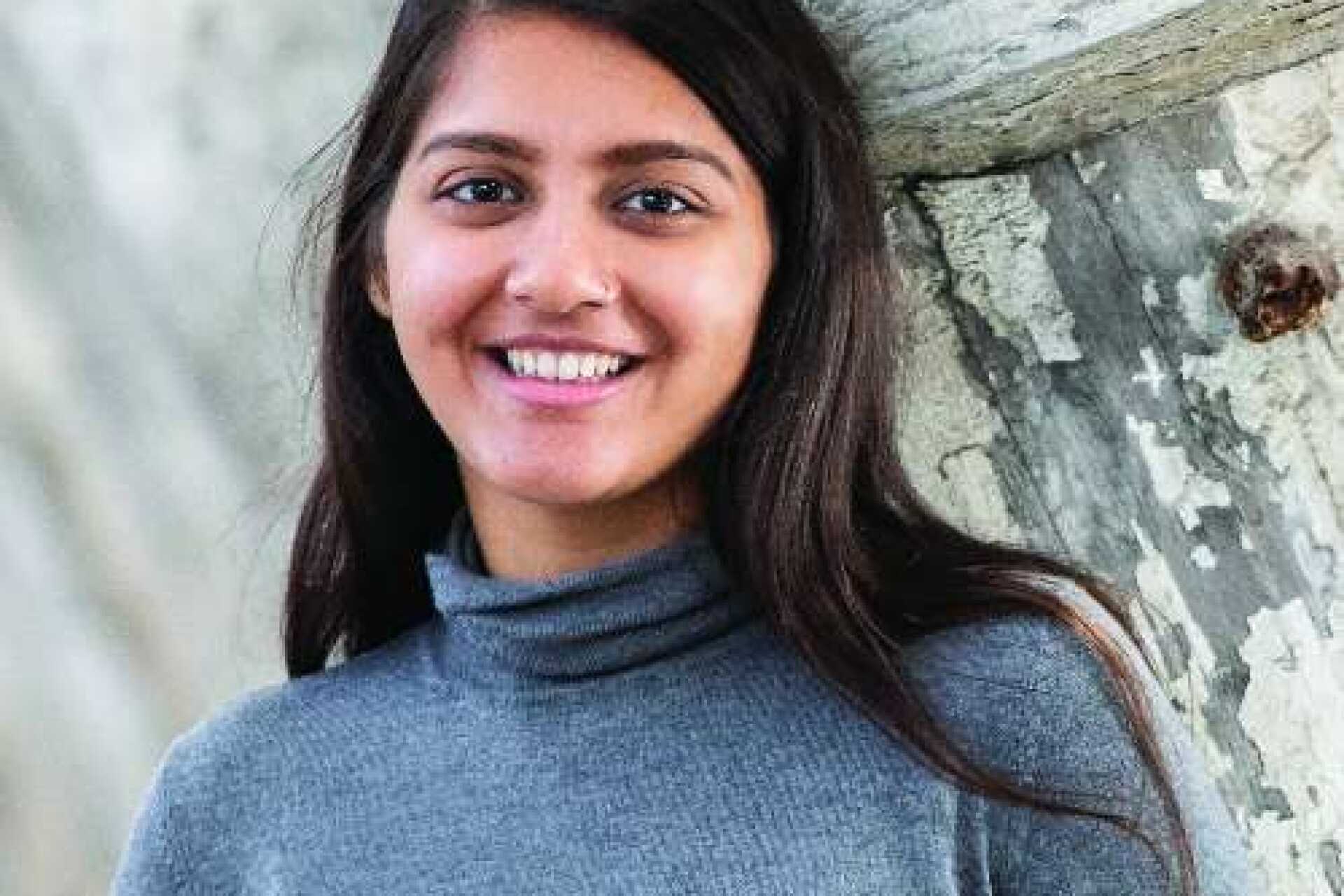
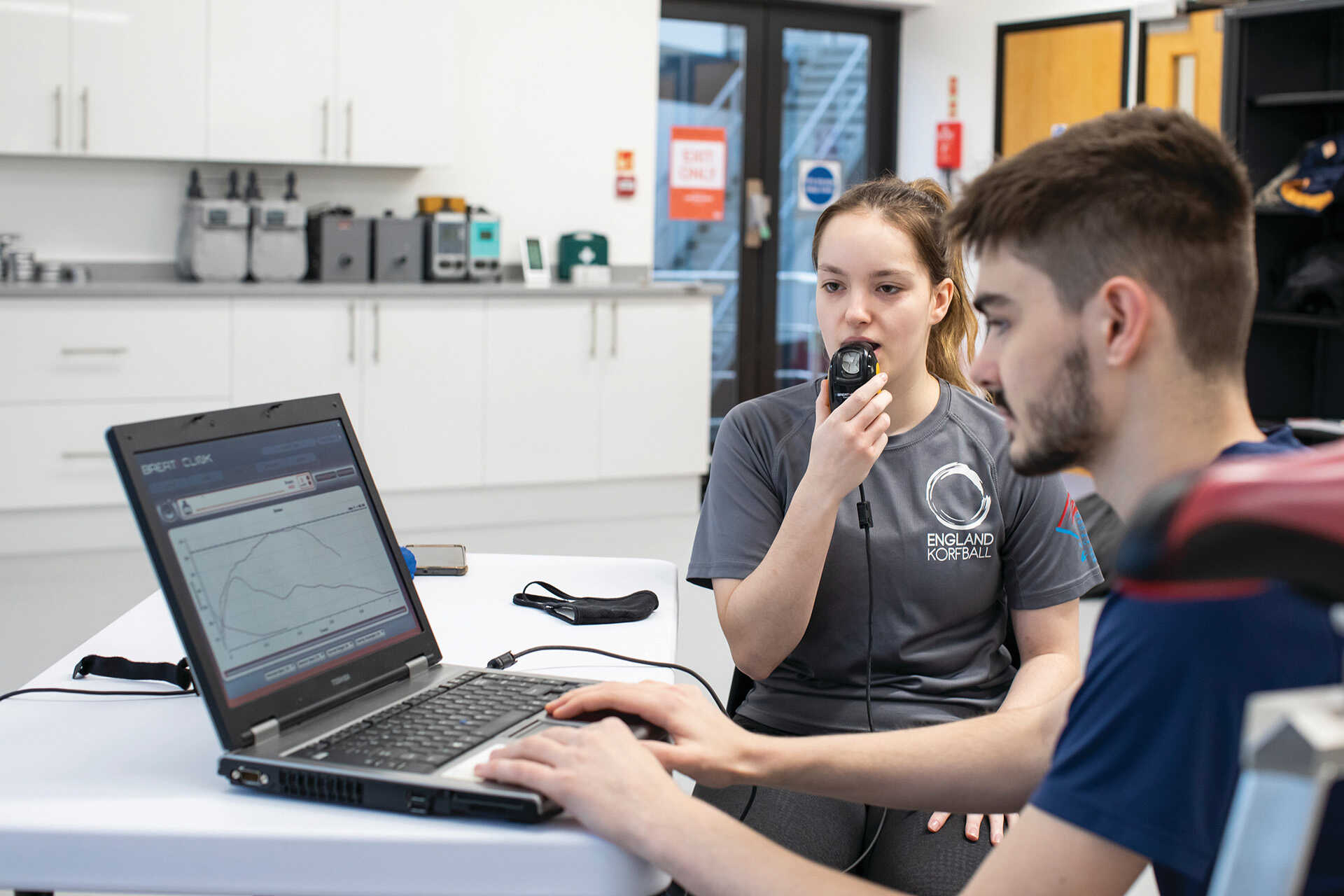
For students continuing on this programme, fees will increase year on year by no more than RPI + 3% in each academic year of study except where regulated.*
The University will assess your fee status as part of the application process. If you are uncertain about your fee status you may wish to seek advice from UKCISA before applying.
For details of when and how to pay fees and charges, please see our Student Finance Guide.
Find out more about accommodation and living costs, plus general additional costs that you may pay when studying at Kent.
Kent offers generous financial support schemes to assist eligible undergraduate students during their studies. See our funding page for more details.
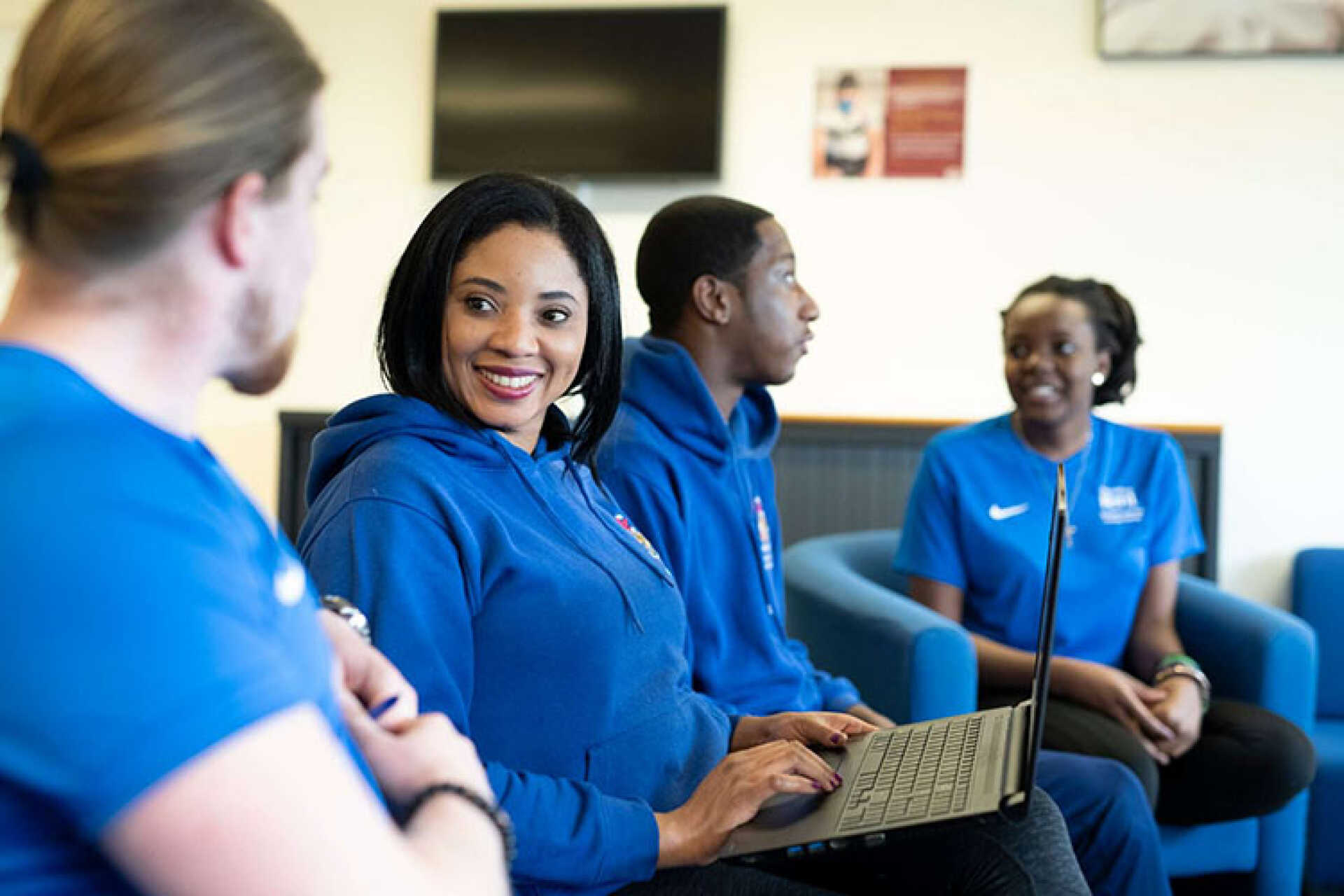
We have a range of subject-specific awards and scholarships for academic, sporting and musical achievement.
We welcome applications from students all around the world with a wide range of international qualifications.
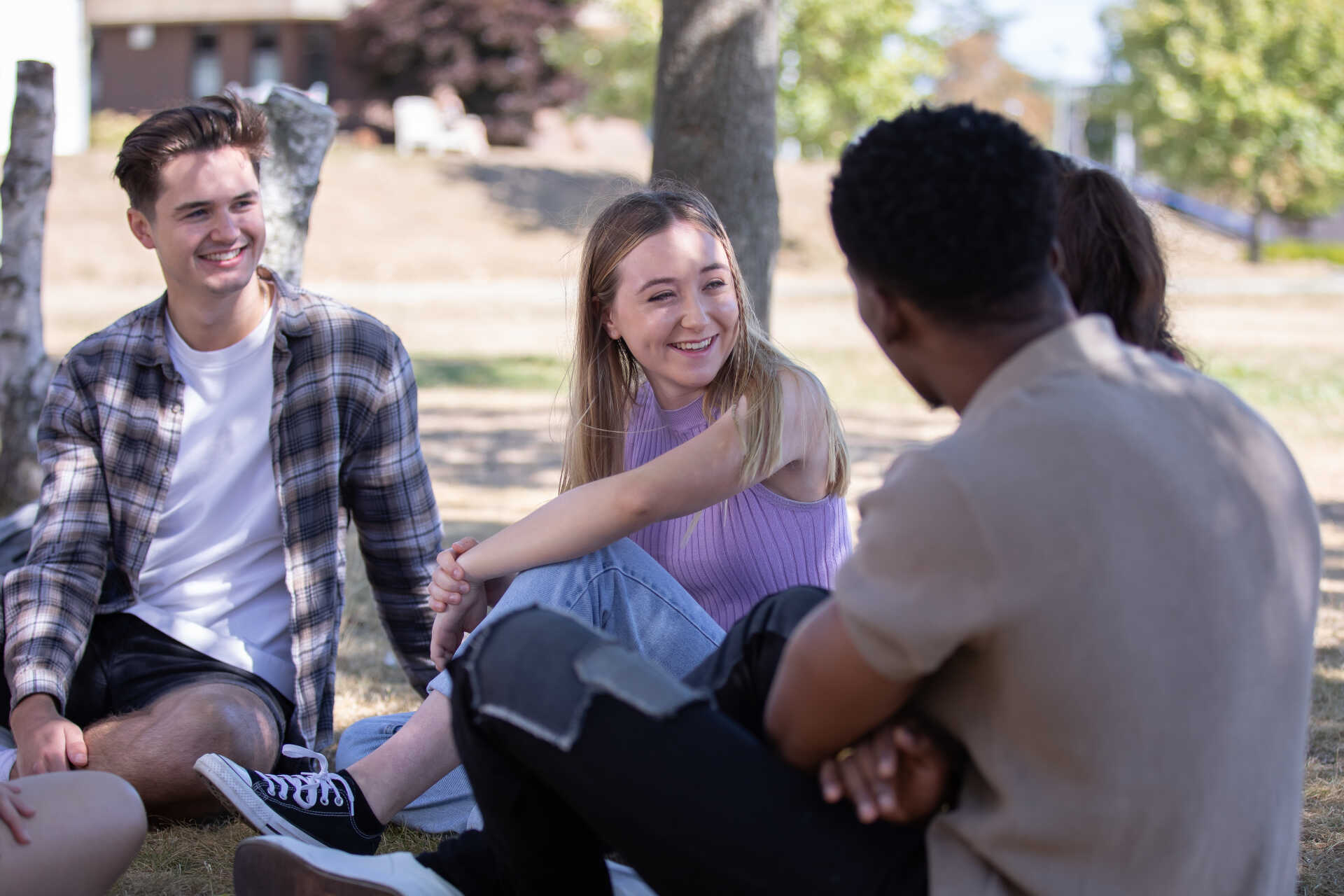
Student Life

In the QS World University Rankings 2024, Kent has been ranked 39th within the UK and is in the top 25% of Higher Education Institutions worldwide.
Kent Sport
Kent has risen 11 places in THE’s REF 2021 ranking, confirming us as a leading research university.

Guaranteed when you accept your offer at Kent.